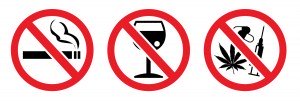I’ve spent many years working with counselors and rescue mission staff members to assist them to more effectively help homeless addicts and alcoholics. Whenever I speak on this topic, I am usually challenged for saying clients should be immediately dismissed from a program when they are discovered to have used alcohol or drugs. So, I thought it would be useful to restate my convictions – and my rationale for this encouraging this policy.

I am convinced that we must immediately dismiss anyone who uses alcohol or drugs while in a recovery program. The dismissal must be for at least one month, with the possibility for an evaluation for re-admission after that time period. If they do re-enter the program, they should start over – from day one – and not be allowed to regain whatever status they held before using.
Does this mean we should just throw them out on the street? Not necessarily; it might mean moving out of the program part of the building and back into the transient section. It could also mean a referral to another facility. Or, it could mean leaving the building and finding their own way to the next place, especially in the case of those who have violated the policy repeatedly.
There must be serious consequences for alcohol and drug use while in a recovery program. Here’s why:
-
A.Drunk in the Bank – When people are new to residential recovery centers, they usually determine “how many drunks they have in the bank.” Their first question is “How does the staff deal with clients who use drugs and alcohol while in the program?” If the policy is dismissal after their second incident of using, this equals “two drunks in the bank.” Then, they may actually begin planning how and when to use them. In essence, a firm policy on dismissal after the first use of alcohol and drugs actually helps to keep participants from being tempted in this way.
B. The Danger of Enabling – One rescue mission had a formerly homeless cook who worked for them for a number of years. Once or twice a year, he would go off for “one of his weekends” which meant disappearing for a couple of days of heavy drinking. Then, he would come back and “behave” himself until the next time. Is this really helping him? And what a terrible example! If we really believe addiction to drugs and alcohol is destructive, using them must have major consequences.
Addicts continue to use alcohol and drugs as long as they feel the benefits outweigh the costs. Consequences are the key to their salvation. They are God’s way of breaking through denial. But if we choose to enable people to continue in destructive ways, shouldering the consequences ourselves, we interfere in what He wants to do in their lives.
C. Maintaining an Environment that Promotes Positive Change – A sincere desire to become free of mind-altering substances must be the first requirement for entry into a recovery program. And is it the responsibility of the staff to maintain an atmosphere that says, “people are here to recover – the program is for people who want sobriety and are committed to working on their lives.” The consistent application of a firm dismissal policy works to promote a commitment to the recovery process among program participants. If it is not practiced with consistency, staff members will be accused of favoritism or the program participants will assume that the staff does not take the use of alcohol and drugs seriously. Handling the issue of dismissal on a “case by case” basis creates a system of inequity that works against the positive environment we need to have in the program.
D. Protecting the Sincere Client – The application of this “tough love” principle is needed to protect those residents who are sincerely trying to change their lives from those who are not. Keeping hard-hearted and disruptive people around can be extremely discouraging to those individuals who are working hard at their own recovery. It can be truly amazing to sense the dramatic change in the atmosphere of a program when one or two disruptive individuals are removed. Sincere people can be further motivated and reassured when they know that they will not have to contend with uncommitted and dishonest people who could undermine their efforts toward recovery.
A Final Thought – It is important to keep a recovery program “drug free.” But, it is actually cruel to expect residents to stay sober if we do not provide them with access to activities such as addiction counseling and meetings that support them in the pursuit of a life of sobriety. Doing this is truly setting addicts up to fail.
